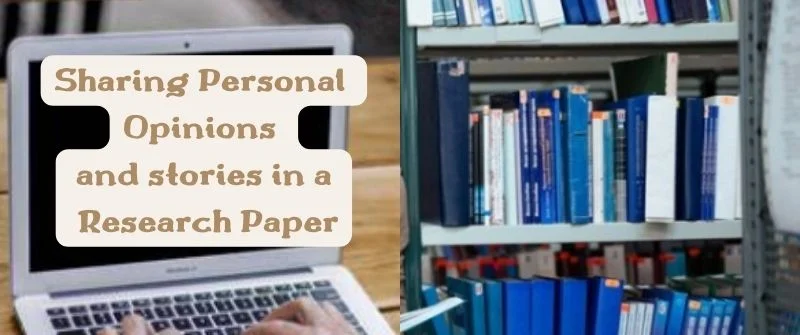One should write research papers objectively and in an unbiased way. However, whether it is right to include personal opinions, experiences, or stories in a research paper arises.
In this brief discussion, we will explore this topic and determine the circumstances in which such content might be suitable.
Can a Research Paper have Opinions?
Ultimately, the necessity of including opinions in a research paper will depend on the particular requirements of the assignment or publication.
A research paper can have opinions and personal views if they are necessary for the analysis or reflection of the data gathered during the research. If allowed, a writer can use opinions in a research paper but this depends on the type of paper and the context in which the opinions arise. However, research papers should be objective and based on one analysis of evidence rather than personal opinions.
However, there are particular research papers, like review articles or opinion pieces, where the author’s opinions and perspectives are an asset part of the paper.
Additionally, researchers may include their own opinions or interpretations of their data in the discussion section of a research paper. It is critical for researchers to be open about their biases and to offer evidence to support their opinions.
Can a Research Paper Have Personal Experience?
Using personal experience to improve your research is a common aspect of your essay writing. Depending on the topic your are writing, this can happen.
A research paper can have personal experience if observational results need to be presented by the author or researcher. Including personal experiences in a research paper can be appropriate, but it depends on the context and type of paper. For instance, ethnographic papers will have personal experiences from the observation made.

Personal experiences add a human element to a research paper. It helps illustrate the practical applications or implications of the presented research.
For example, a researcher studying a specific medical condition may use personal anecdotes from individuals with the condition to assist readers in understanding its impact on their lives.
However, it is vital to maintain a balance between personal experiences and objective analysis. Use personal experiences sparingly and do not detract from the research or the presented argument.
Additionally, present personal experiences in a respectful way that does not compromise the privacy of the individuals involved.
As with opinions, support personal experiences with evidence to avoid confusion between personal beliefs and objective findings.
Use personal experiences in a research paper thoughtfully and with the overall purpose and audience in mind. This however should be done in the best practices of how to write a good term paper or research paper.
How to Include Personal Opinion in a Research Paper
Using personal opinions in a research paper needs careful consideration of the context and purpose of the paper. Here are some steps to follow when including personal opinions in a research paper:

- Identify the appropriate section: Include personal opinions in a research paper’s discussion section. Such a section enables the author to interpret and explain the study’s results in their own words.
- Be transparent about biases: It is important to be open about personal biases that may affect your opinions. One can do this by acknowledging them in the paper and explaining how you have attempted to minimize their impact on the research.
- Use evidence to support opinions: Support personal opinions with evidence and analysis. It can include citing previous research, giving examples or anecdotes, or presenting data that supports your argument.
- Avoid emotive language: Let personal opinions appear neutrally and professionally. Avoid using emotive language or expressing personal feelings in a way that may get interpreted as unprofessional or biased.
- Consider the audience: Present personal opinions in a way that is appropriate for the intended audience. For example, a research paper intended for a scientific journal may need a more formal and objective tone than one intended for a general audience.
- Maintaining balance: Avoid letting personal opinions dominate the paper or detract from the presented research. It is vital to keep a balance between personal opinions and objective analysis.
- Seek feedback: Before using personal opinions in a research paper, seek feedback from colleagues or advisors. This can help to ensure that the opinions are appropriate and presented professionally and effectively.
Using personal opinions in a research paper is a great way to offer context and interpretation for the results of a study. However, it should happen thoughtfully and with careful consideration of the context and purpose of the paper.
Some papers and topics encourage personal opinion. Check out our English 102 example topics and see some of those that could require you to use some personal touch to it.
Can a Research Paper Have Stories?
A research paper can have stories if they are required in the instructions or if they are part of the points being presented. Stories can be added to a research paper if they need to be reported as they were, especially in regard to ethnographic papers that require a researcher to observe and report the observations. Also, stories can add a human element and help readers connect with the studied topic.

However, like personal opinions and experiences, stories should appear sparingly. They should be distinct from the objective analysis and evidence presented in the paper.
If used, they should present stories respectfully and professionally. Explain their relevance to the research.
Instances when to use personal stories in a research paper
I can use personal stories in research papers to illustrate and support the findings in specific instances. Here are some examples:
- Qualitative research: In qualitative research, personal stories or experiences can serve as data to offer an in-depth understanding of a phenomenon. These stories can show up in the results section of the research paper to illustrate themes or patterns that emerge from the data.
- Case studies: One can use personal stories in case studies to offer a detailed analysis of a particular individual or group. These stories can demonstrate the impact of a particular intervention or treatment or provide context for the study’s findings.
- Ethnographic research: In ethnographic research, one can use personal stories to describe a particular group’s cultural practices and beliefs. These stories can appear in the discussion section of the research paper to offer insights into the participants’ lived experiences.
- Health research: one can use personal stories in health research to illustrate the impact of a particular condition or treatment on individuals and their families. You can include these stories in the introduction or discussion section of the research paper. They should offer context for the study and highlight the research’s importance.
- Social sciences: Use personal stories in social sciences to offer insights into the experiences of marginalized groups or to illustrate the impact of social policies on individuals and communities. You can include these stories in the research paper’s results or discussion section. The aim is to provide a more nuanced understanding of the research findings.
Notably, one can include personal stories judiciously, respectfully, and ethically. Researchers must obtain informed consent from participants before using their stories in research. They must take steps to protect their privacy and confidentiality.
Additionally, you can use personal stories in a way that is relevant to the research question and supports the study’s findings. This can be done in specifically sectioned subtitles so as to avoid mixing subjective and objective points.
